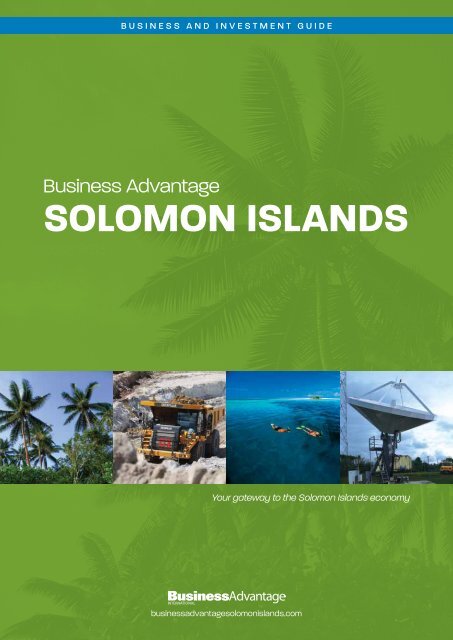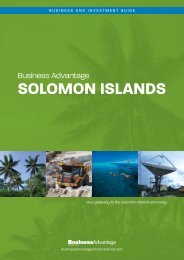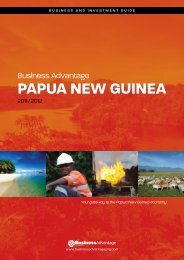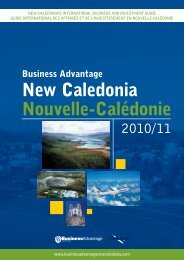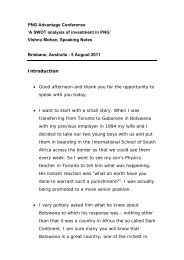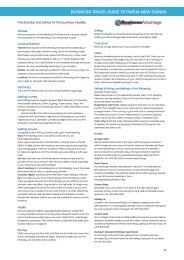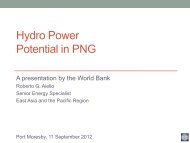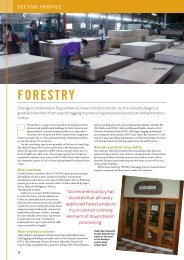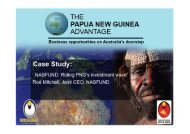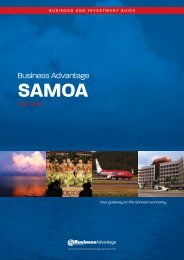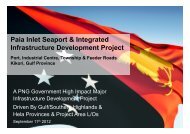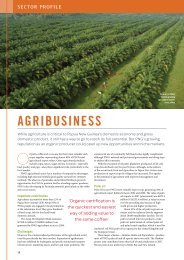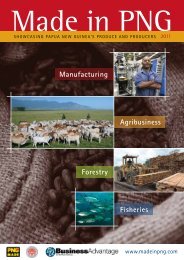Download - Business Advantage International
Download - Business Advantage International
Download - Business Advantage International
- No tags were found...
You also want an ePaper? Increase the reach of your titles
YUMPU automatically turns print PDFs into web optimized ePapers that Google loves.
ECONOMIC UPDATECredit: Solomon Islands Visitors Bureau / Brad MalyonFrom bust to boomLess than a decade after its economy lay in ruins, the Solomon Islands is in remarkably good shape.The Solomon Islands has undergone an economictransformation over the past decade. Its GDP hasmore than doubled since 2003, with its Central Bankestimating 2011 GDP growth at 8.2%, up from 7.2% a year earlier.Meanwhile, the country also achieved its first trade surplus in2011 since 2004—a major milestone indicating the economy hasbounced back from the effects of the global financial crisis.This stronger economic performance has been reflected inemployment growth. While formal employment in a countryheavily reliant on subsistence farming remains very low (around10%), the Solomon Islands National Provident Fund reporting a10% increase in membership in 2010/11. Furthermore, the SolomonIslands Government’s fiscal position is solid and strengthening,with its budget in surplus and cash reserves growing.At the same time, a raft of recent business-focused reforms—online business registration, separation of the land registry fromthe business and movable property registries, and strengthenedinvestor protections under the 2009 Companies Act—has ledthe World Bank to nominate the Solomons as one of the topdozen performers globally in its 2012 Doing <strong>Business</strong> survey. (TheMelanesian nation rose seven places in the bank’s rankings,which measure ease of doing business, in just one year).Trigger for mining boomThis economic rebuilding has been underpinned by the presenceof the Regional Assistance Mission to the Solomon Islands(RAMSI) that arrived in 2003 to bring stability to the nation afterfive damaging years of civil unrest, commonly referred to as 'thetensions'. With RAMSI pledging to remain as long as it is needed(see page 8 for an interview with its Special Coordinator) thereis every reason to believe current economic progress will bemaintained. GDP growth in 2012 is projected at 6.6%.March 2011 saw the highly symbolic re-opening of thecountry’s only mine, Gold Ridge. Forced to shut during thetensions of 2000, Gold Ridge is not only a major enterprise in itsown right but has also become something of a bellwether for thelocal economy. Many believe its revival could provide the triggerfor a full-blown mining boom in a country rich in mineral wealth.Some experts believe that nickel alone could develop intoa multi-billion dollar industry over the coming years, with largeuntapped deposits of gold and copper also currently the subjectof energetic prospecting.‘Despite the growth we are experiencing,full recognition has not yet been given tothe Solomon Islands as an investmentdestination.’TERMS & CONDITIONS APPLY5
Economic updateMAKING LIFE EASIER FOR INVESTORSDerick AihariThe Foreign Investment Division of the Department ofCommerce, Industries and Employment is the first portof call for potential investors in the Solomon Islands.Director Derick Aihari explains its function.What is the role of the Foreign Investment Division?We are the de facto investment promotion agency of theSolomon Islands. Our responsibilities include promoting andfacilitating foreign investment. As required under the ForeignInvestment Act 2005 and Regulation 2006, we also havea monitoring role to ensure foreign investors abide by theirterms of registration.How straightforward is the foreign investment applicationprocess?The 2005 Foreign Investment Act has greatly reducedthe amount of time it takes to process an application. Theapplication form is much shorter and the process has beenstreamlined to improve cooperation from other governmentagencies. Applicants receive a decision within five workingdays. However, it is important for investors to be aware ofthose activities on the Reserved List—that is to say, thosereserved for local operators.What kind of recent reforms should potential investors beaware of?Over the past four years, we have implemented anInsolvency and Receivership Act, as well as a new SecuredTransactions Act and a new Companies Act. These measureshave undoubtedly improved the investment climate in theSolomon Islands. Further reforms are also planned, includingin the area of taxation.What kind of tax incentives are offered to foreign investors?How can they apply for them?Incentives are granted at the discretion of the Minister ofFinance. They include tax holidays and duty exemptions onthe import of certain capital goods.MOBILE INTERNETMobile Internet, a business telecommunication solution to working on the move.kabani blong iumi...For more informationT: +677 21164 E: sales@telekom.com.sbwww.telekom.com.sb7
Economic updateRAMSI REVS UP REFORMSRAMSI’s Nicholas Coppel plays host to United Nations Secretary General BanKi-Moon during his September 2011 visit to the Solomons.The Regional Assistance Mission to Solomon Islands(RAMSI) is a partnership between the people andGovernment of Solomon Islands and 15 contributingcountries of the Pacific region. Since its arrival in 2003,RAMSI has played an important role in helping theSolomon Islands lay the foundations for long-termstability, security and prosperity. <strong>Business</strong> <strong>Advantage</strong>caught up with RAMSI Special Coordinator NicholasCoppel in November 2011 for an update on its progress.The role of the RAMSI mission has clearly evolved. Whatexactly does this ‘transition’, as you refer to it, entail?When RAMSI arrived in 2003, the focus was on 'doing':managing the economy and the government’s finances,law and order, security and correctional services. Today,the focus is clearly moving to capacity building. There'sbeen an enormous amount of progress in the area ofeconomic reform that has been introduced, and I think it'sfair to say that a lot of the strong growth that’s been seen inSolomon Islands today is a result of those reforms that wereintroduced through the Economic Reform Unit. That processis continuing but in more detailed, less visible areas.What are the main initiatives you are undertaking?Sound management of the economy remains very importantfor investor confidence, so we’re continuing to providesupport in that area in terms of bringing together the budget.For instance, we are trying to link up and connect the publicservice payroll with the finance system. This means that theMinistry of Finance and Treasury will have a much betterunderstanding of the government’s payroll, which is the majorexpense of government.Secondly, there are no proper processes and systems inplace for government procurement, so we are working withthe Solomon Islands Government to develop those.We’re also continuing to work with the Internal RevenueDivision, and an amendment to the Customs Act has beendrafted that just needs to go through Parliament.Can you confirm that RAMSI will remain for as long as it isneeded?RAMSI is in no rush to leave the Solomons. It is importantto maintain confidence in the security environment here,and in turn confidence in the economy and the businessenvironment. In a way, downsizing or transitioning RAMSIshould help improve confidence in the Solomon Islands, nottake it away. It’s a way of showing that the Solomon Islandsis back in business. It is a normal country again and does notneed an extraordinary intervention.That said, there is still more work to be done with the RoyalSolomon Islands Police Force. We recognise that and we areworking with them to get them up to speed.Our numbers will be coming down but they will not be goingto zero. There will still be a very significant RAMSI policepresence in the middle of 2013. In fact, 2013 simply marks thestart of the next four-year cycle of funding, not the end of themission. That hasn’t been well understood by many in theSolomon Islands.Further informationwww.ramsi.orgCredit: Solomon Islands High CommissionCredit: Solomon AirlinesThe Solomon Islands’ new chancery in Canberra, Australia.8The FlySolomons Running Festival, which includes a marathon, is a popular annual event.
Economic updateTHE INVESTMENT APPROVAL PROCESS IN THE SOLOMONSThe following information is an abridged version of the‘Guide to Investment in the Solomon Islands’ includedin ANZ <strong>Business</strong> Investor Guide: Understanding YourInvestment Options in the Solomon Islands.The following steps must be undertaken by investors wishingto establish a business in the Solomon Islands.Office of Registrar of Companies (ROC)www.investsolomons.gov.sb> Registration of business/company name> <strong>Download</strong> application form (Form 2 available on website)Foreign Investment Division (Solomon Islands Government)> Registration must be done via submission of thecompleted application form (as above) and a registrationfee of SBD$200> Checklist is available from www.investsolomons.gov.sbForeign Investment DivisionThe following steps are normally taken by the ForeignInvestment Division in assessing an investment application:> Receipt of application with appropriate fees and requireddocuments (refer fees and requirements section on www.investsolomons.gov.sb)> The Registrar shall assess the application to determinewhether or not the application specifies all the informationrequired under section 16 of Foreign Investment Act2005, and whether the information specified is sufficientfor determining the nature of each investment activityspecified in the application.> This process usually takes around 7 to 10 days, dependingon the provision of all required documents.Immigration DepartmentThe investor will then need to apply to the immigrationdepartment that will:> Check criminal history/connection and character asrequired by the Immigration Act> Issue key post residency permits to foreign investors.Labour DepartmentThe investor will need to apply to the Labour Department,which will:> Check criminal history/connection and character asrequired by the Immigration Act> Issue key post work permits to foreign investors> Work permit checklist is available fromwww.investsolomons.gov.sbSolomon Islands Revenue & Customs Authority> Ensure ROC registration has been obtained beforeprocessing applications> Register the enterprise for Income Tax, PAYE, Goods andServices Taxes purposes, and issue Tax IdentificationNumbers (TIN) provided enterprises comply withapplication requirements> Apply to Inland Revenue and Customs for investment andtax incentives (for more on incentives refer towww.investsolomons.gov.sb)City/Town Council <strong>Business</strong> Licences> Apply to Honiara City Council to obtain a business licence.Solomon Islands National Provident Fund(www.sinpf.org.sb)> Registration of employee and employer superannuation.Other Government agencies> May be required, depending on the nature of business.Banks> Establish a banking relationship in the Solomon Islands.Morris & Sojnocki Chartered Accountantsaccounts for more business in the Solomon IslandsMorris & Sojnocki is the leader in Assurance and <strong>Business</strong> Advisory services.For specialist business advice call Wayne Morris or Greg Sojnocki, the expertsin the Solomon Islands.Contact - wayne@msca.com.sb or gregs@msca.com.sb11
Information & communications technologyRivals rise to the challengeThe Solomon Islands’ telecommunications sector is moving forward at breakneck speed.<strong>Business</strong> <strong>Advantage</strong> assesses recent developments and their implications for the economy.It is hard to believe that it was not until late 2009 that theSolomon Islands Government awarded a second mobilephone licence, breaking the monopoly of Our Telekom (thetrading name of Solomon Telekom Compnay Limited).Things have changed quickly. New entrant, PNG-basedBemobile, rolled out its own network in a few months,commencing operations in August 2010 (see box opposite). Sincethen both it and Our Telekom have wooed consumers with a mixof great deals and new services. Prices have dropped, coverageacross the dispersed archipelago has increased dramaticallyand the mobile penetration rate has soared from a single digit tomore than 50% of the population. While that growth curve willinevitably flatten out, new services such as mobile broadbandand SMS banking will increase the usage of networks that arealready creaking under the weight of high demand.Bernard Hill, the Commissioner of the TelecommunicationsCommission of the Solomon Islands (TCSI), arrived in theSolomons in 2011 to take up his role. ‘What really impressed mewas how clean the legislation was here. It’s world best practice,’he says. With deregulation now fully complete, new players arealso expected to spring up.Upgrade for core networkThe key to the sector’s dynamism, says Hill, is that genuinecompetition exists. The regulator’s satisfaction acknowledgesthe fact that Our Telekom is rising to the challenge. ‘We’re copingTHE BANKING SECTOR ON THE CUSP OF TRANSFORMATIONThe massive expansion of mobile phone coverage is setto transform the dynamics of the nation’s banking sector.Just five years ago there was no mobilephone coverage outside Honiara, andprecious few landlines, whereas by theend of 2011 coverage had expandedto 60% and will grow further in 2012.This new national network is going todo more than merely let subscriberscommunicate with each other. For thoseWestpac's Kutila Pintoliving in urban areas it will also makebanking more convenient, while for many rural residents,formerly isolated by geography, it will give them access tobanking services for the first time.‘Advances in mobile phone technology will give us theopportunity to take the market outside Honiara,' saysWestpac’s General Manager Kutila Pinto. ‘While branches stillhave a role, banking is not restricted to four walls anymore, itcan be done anywhere.’In 2011 Westpac successfully launched its mobile bankingoffering in nearby Fiji, with the Solomons and other Pacificjurisdictions expected to come on board in 2012. Thetechnology enables registered users the ability to performsimple banking transactions via SMS, such as transferringmoney from one account to another, checking an accountbalances, or requesting a cheque book. Meanwhile mobileEFTPOS machines will make life easier for merchants,particularly tourism operators.Naturally, the country’s other two banks are also keento capitalise on this revolutionary electronic platform. ForBank South Pacific, which already has a well-establishedphysical network of branches and agencies around thecountry, it provides a way to improve the efficiency of its ruraloperations (see page 10).Meanwhile, ANZ’s Chief Executive Officer in the Solomons,Barry Sowman, reports that the bank is ‘looking to expandthe reach of our merchant services network, as well asdevelop account offerings that minimise fees for thosecustomers who do their banking outside of a branch.’12
Information & communications technology‘What really impressed me was how cleanthe legislation was here. It’s world bestpractice.’with competition,’ says CEO Loyley Ngira, ‘We’re not beingcomplacent.’Our Telekom launched its 3G network in 2010, enabling dataaccess for its subscribers. It has also introduced a mobileinternet service, whereby Internet can be accessed using the 3Gnetwork through Internet capable mobile phones or via a laptop(using a modem/dongle). This complements, rather than replaces,its wireless internet service, available in Honiara via a series ofhotspots (in hotels etc).Its core mobile network will receive a further upgrade in 2012with the roll out of another 50 mobile sites across the country.Undersea cable linkBoth Our Telekom and Bemobile were recently allocatedadditional spectrum by TCSI to enable them to increase thecapacity of their networks. When it comes to internationalconnectivity, however, the solution is less straightforward.‘Our network upgrade will further increase the pressureon upstream bandwidth,’ says Loyley Ngira. He is referringto the Solomons’ reliance on costly satellite connectivity, tocommunicate with the wider world (and especially the worldwide web), that acts as a bottleneck, slowing internet speedsand pushing up the overheads of local carriers.The ideal solution would be an undersea fibre optic cable linkBEMOBILE ON A ROLLIn December 2009, the Solomon Islands Governmentmade the historic announcement to award the country’ssecond mobile phone operating licence to PNG-basedBemobile. Originally a wholly owned subsidiary ofTelikom PNG, in 2008 50% of Bemobile was acquired bya private consortium of local and international investors.The strong parallels between the telecommunicationssectors in PNG and the Solomons serve to enhance thesynergies that Bemobile enjoys by operating in bothmarkets.It took just six months to roll out the first stage of its networkbefore launching on 31 August 2010. By the end of 2011,Bemobile had signed up 118,229 subscribers and was on thepoint of offering them 3G services.Alan Barry, Head of Marketing, says it was a major challengeto build its network so quickly in such a harsh environment:‘Providing power to remote sites was the biggest hurdle wefaced. We now have our own engineers based around thecountry and have even purchased two boats for betteraccess.’The company’s network now covers more than 50% of thepopulation and this is set to expand in 2012, in part thanks tofunding from the Asian Development Bank. It will also openan office in Malaita Province.Given the low disposable income of the average Solomonbut this would require a major investment. Encouragingly, seriousdiscussions are underway in this area in collaboration with donoragencies. The Solomons could connect to an existing underseanetwork via a spur to minimize construction costs or opt for aseparate submarine cable. Loyley Ngira says the project would‘change the whole business environment’.Government takes the leadTCSI is turning its attention to the more remote parts of thepopulation for whom it is not commercially viable for operatorsto provide mobile coverage. According to Bernard Hill, a UniversalAccess project, which should commence in 2012, ‘would relyon sponsorship from donor organisations to grow the networkfurther’. The existing mobile phone operators would be invited tobid on a piecemeal basis. For each parcel of territory, the winningbidder would be subsidized to add it to their network.For larger entities like corporations and governmentdepartments, connectivity alone does not necessarily equate toeffective communications.Tony Koraua, Country Manager of ICT services providerDaltron, says: ‘Computers are extremely under-utilised in thiscountry. It is one thing to provide someone with a laptop but theywill get limited benefit if their organisation has no databases, nointegrated systems, no email server.’To get its own house in order, the Solomon Islands Governmentissued a tender in late 2011 for a Metropolitan Area Networkto connect all 26 SIG departments in Honiara, spread acrossalmost 100 physical locations. The RAMSI-funded project aimsto ‘facilitate the provision of basic ICT services to all governmentoffices in a cost and human resource efficient manner’.Island consumer, Bemobile set out to keep the cost ofhandsets very low and thereby remove the main barrier tomobile phone take-up. However, it is also discovering that ina market where gadgets are not ubiquitous many customerswant to do more with their phone than just talk.‘We’ve discovered that people love listening to music ,including via a loudspeaker,’ says Barry. ‘They also like usingit as a camera, and even as a torch, so there is a need tobalance features with price.’Credit: BemobileThe rollout of Bemobile’s network in the Solomons is continuing13
Who’s who in Solomon Islands businessBanking, Finance &InsuranceANZ+677 21111www.anz.com/solomonislandsBSP (Bank South Pacific)+677 21874www.bsp.com.sbWestpac+677 21222www.westpac.com.sbAgricultureGuadalcanal Plains Palm Oil+677 21003/21005www.nbpol.com.pgSOLOMON ISLANDS PORT MORESBYP+ 677 25100 P+ 675 302 2200F+ 677 25114 F+ 675 325 6558www.daltron.com.sb14MiningGold Ridge MineSolomon Islands office+677 38351www.alliedgold.com.auFisheriesNational FisheriesDevelopments+677 30991Soltai (canned tuna)+677 61012Diplomatic Missions inHoniaraAustralian High Commission+677 21561Looking for a reputablecompany who providesprofessional IT Solutionsand Services?Wanting to stretch your ITbudget further?Look no further...√ Project Management √ SPAM Management√ Disaster Recovery Planning √ ISP Services√ IT Consulting√ Software Development√ Right Sourcing√ <strong>Business</strong> Process Consulting√ Outsourcing your IT systems √ All Consumables and Copy CentreLAEP+ 675 472 8449F+ 675 472 8455VANUATUP+ 678 22537F+ 679 6724832 F+ 678 23559email: sales@daltron.com.sbSUVANADIP+ 679 3315091 P+ 679 6724822F+ 679 3315093British High Commission+677 21705Japan Embassy+677 22953New Zealand HighCommission+677 21502Papua New Guinea HighCommission+677 21502Republic of China (Taiwan)+677 38050ForestryEarth Movers/Pacific Timbers+677 30385Kolombangara ForestProducts Ltd+677 21078MiscellaneousAsian Development Bank(ADB)Pacific Liaison andCoordination Office (ADBSydney)+61 2 8270 9444www.adb.orgAustralian Trade Commission(Austrade)c/- Austrade Port Moresby,Papua New Guinea+675 325 9150Australia-Pacific <strong>Business</strong>Council+ 61 7 3348 5142www.apngbc.org.auCentral Bank of the SolomonIslands+677 21791www.cbsi.com.sbForeign Investment Division(Ministry of Commerce,Industries & Employment)+677 22851<strong>International</strong> FinanceCorporation (IFC)/World BankRegional office+61 2 9235 6519www.ifc.orgwww.worldbank.orgPacific Islands Trade & Investwww.pacifictradeinvest.comTrade and investmentpromotion arm of the PacificIslands Forum. Offices inAuckland, Shanghai, Sydneyand Tokyo (check website fordetails).Regional Assistance Missionto the Solomon Islands(RAMSI)+677 25122+677 24703 (Public Affairs Unit)www.ramsi.orgTelecommunicationsCommission of the SolomonIslands (TCSI)+677 23862www.tcsi.org.sbTransportPacific Air Cargo+61 7 3268 6633www.pacificaircargo.com.auSolomon Islands PortsAuthority+677 22646Tradco Shipping+677 22588TourismHeritage Park Hotel+677 24007www.heritageparkhotel.com.sbSolomon Airlines+677 20031www.flysolomons.comSolomon Islands VisitorsBureau+677 22442www.visitsolomons.com.sb<strong>Business</strong> ServicesAustAsia Pacific Health+61 7 55964622www.webbpacific.com.auBemobile+677 20776www.bemobile.com.sb
Who’s who in Solomon Islands businessCredit: Solomon Islands Visitors BureauUSEFUL ONLINE RESOURCES FOR THE SOLOMON ISLANDSwww.pmc.gov.sbSolomon Islands Department of Prime Minister and Cabinetwww.whitepages.com.sbThe Solomons online White Pageswww.solomonchamber.com.sbSolomon Islands Chamber of Commerce and Industrywww.solomonstarnews.comSolomon Star newspaperwww.businessadvantagesolomons.comThe online version of this publication plus other useful Pacificbusiness resources.www.islandsbusiness.com/news/Islands <strong>Business</strong>—general news on the PacificDaltron+677 25100www.daltron.com.pgPacific-wide IT servicesproviderHastings Deering+677 30274www.hastingsdeering.com.auMorris & Sojnocki (Charteredaccountants)+677 21851wayne@msca.com.sbAssurance and businessadvisory servicesSilentworld Shipping &Logistics+677 20956www.silentworld.com.auSol-Law+677 23886sollaw@solomon.sb.com.sbConstructionFletcher Kwaimani JV+677 30556kwaimani@solomon.com.sbInfrastructureOrigin Energy+677 21833Our Telekom+677 21576www.telekom.com.sbSolomon Islands ElectricityAuthority (SIEA)+677 30495Solomon Islands WaterAuthority (SIWA)+677 23985Industry AssociationsSolomon Islands Chamber ofCommerce & IndustryContact: Calvin Ziru+677 39542sicci@solomon.com.sbwww.solomonchamber.com.sbAssociation of SolomonIslands Manufacturers+677 38553stp@solomon.com.sb<strong>Business</strong> Council of SolomonIslands+677 30304solnoodle@solomon.com.sbSmall and MediumEnterprises Council (SMEC)+677 26789/76797Women in <strong>Business</strong>+677 26891Manufacturing/IndustrialSouth Pacific Oil+677 21838www.spo.com.sbSolomon Breweries+677 30257Solomon Tobacco+677 30127www.bat.comSunrice+61 2 9268 2000www.sunrice.com.auSzetu Enterprises Limited+677 30304Producer of soft drinks andpurified drinking waterY Sato (Roviana) & Co+677 21620We’re local knowledge.Westpac has a long history of financial expertise in the Solomon Islands. Backedby industry experts in commodity, energy, telecommunications and public sectorfinancing your business is in professional hands.So for all your Institutional, Corporate and <strong>Business</strong> Banking needs talk to thebank that speaks your language.Call 677 21222Email westpacsolomons@westpac.com.auVisit Mendana Avenue, Honiara or westpac.com.sbWe’re a bank you can bank on.259500 (01/12)15
Infrastructure & transportA cruise liner tied up onHoniara’s Point Cruz Wharf.Poised to seize powerInadequate infrastructure is arguably the most powerful brake on the nation’s economic development.Though the task is immense, several exciting initiatives are underway to address the situation.It is hard to imagine a country anywhere in the world that ismore challenging in terms of infrastructure provision thanthe Solomon Islands. The population of just over 500,000 isscattered over hundreds of islands that are prone to very highrainfall and even earthquakes. However, donor agencies haveidentified infrastructure as a priority and progress is being made.PowerThe Solomons is among the world’s most expensive countriesfor electricity. Naturally, this puts up the cost of doing businessand limits consumer access, with some estimates suggestingthat only 20% of the Solomon Islands population has access toelectricity supplied by the Solomon Islands Electricity Authority(SIEA).The capital, Honiara, has been prone to power cuts in recentyears, with larger businesses relying on back-up generators.Further afield, major projects such as Guadalcanal Plains Palm Oiland the Gold Ridge Mine generate their own power.At an operational level, root and branch reform of the nationalelectricity utility is a very positive step (see box below), while theREVAMP TO LURE BUSINESSImprovements to state-owned water and powercompanies are set to make it easier to do business inthe Solomons.When the Asian Development Bank’s report, Finding Balance:Benchmarking the Performance of SOEs in Fiji, MarshallIslands, Samoa, Solomon Islands, and Tonga, stated that theSolomons’ state-owned enterprises were among the region’smost inefficient, no one was surprised. Although the studywas based on the 2002-2008 period, the inadequaciesof power and water supply in particular remained high onthe list of impediments to doing business in the Solomonswhen the report was actually published in May 2011. And yetprograms were underway to turn these key utilities around.Both the Solomon Islands Electricity Authority (SIEA) andSolomon Islands Water Authority (SIWA) have suffered fromsimilar problems, including poor management, inadequateinfrastructure, illegal by-pass and bad debts, that havecombined to create a vicious circle. To compound matters,SIWA is SIEA’s largest client.In response, the World Bank launched a project in early2009 to reform SIEA in partnership with the Solomon IslandsGovernment. Edith Bowles, the World Bank’s former CountryManager in the Solomons, reported to <strong>Business</strong> <strong>Advantage</strong> inlate 2011 that SIEA had clearly turned the corner: ‘Collection ofrevenue is up, new systems are in place and training is beingdone. Overall, the picture is looking better in terms of SIEAkeeping the lights on and fulfilling its basic function.’A similar program has subsequently been launched byAusAID to rehabilitate SIWA. New management is in place andconsumers are being cut off for not paying bills. This activityis being complemented by investment from Japan’s donoragency (JICA) in core infrastructure such as pumps and pipes.Although progress in infrastructure is always slow, it seemslike the vicious circle is at last changing into a virtuous one.16
Infrastructure & transportTHE SOLOMONS' HYDROPOWER FUTUREThe Solomons’ first major hydropower project wouldreduce fuel imports.Like many Pacific countries, the Solomon Islands isdependent on imported fossil fuels for power generation.This reliance, which places a S$420 million annual burdenon the Solomon Islands Electricity Authority, is a seriousimpediment to widespread electrification and, consequently,economic development.The September 2011 Pacific Infrastructure PerformanceIndicators study ranked the Solomons last among 12 Pacificterritories for power generation per capita. In this context, theplanned Tina River Hydropower Development Project is likelyto be a major transformative project.The project, still subject at the time of writing to Governmentapprovals, would see the building of a 145 metre dam acrossthe Tina River south west of Honiara and the construction ofa 14 megawatt hydropower facility that could provide up to50% of Guadalcanal’s power needs.Since we first reported on the project in the last edition of<strong>Business</strong> <strong>Advantage</strong> Solomon Islands (February 2010), atwo-stage European Investment Bank-funded feasibilitystudy has been completed by Entura (the consulting arm ofHydro Tasmania in Australia).Expressions of interest have also been sought for thecompletion of an environmental and social impactassessment.Funding such a major project represents a challenge. Underthe 2005 Honiara Club Agreement, the Solomon IslandsGovernment voluntarily placed limits on its ability to borrow,meaning major projects such as Tina River must be fundedusing a public-private partnership (PPP) model.‘This is a hugely important project for the SolomonIslands,’ notes Marcos Vaena, Country Coordinator for the<strong>International</strong> Finance Corporation, which is advising theSolomons Government on structuring the PPP component ofthe project.Vaena told <strong>Business</strong> <strong>Advantage</strong> he has been encouraged byearly interest from potential developers. At the time of writing,a request for proposal was expected in the second quarter of2012, with final bids for building the project due in early 2013.If all goes according to plan, the Tina River hydropower facilitycould be operational as early as 2016, providing not onlyincreased baseload power to the island of Guadalcanal butalso a blueprint for hydropower projects elsewhere in theSolomons.The feasibility study for the Tina River hydro project has involved extensivegeological drilling.Credit: World Bank‘Some estimates suggest that only 20%of the Solomon Islands population hasaccess to electricity.’Tina River Hydropower Development Project could enable powerto be generated onshore as opposed to importing expensivediesel (see box above).Other renewable forms of energy could potentially be used toprovide electricity to the country’s rural population.WaterThe situation in the area of water supply and sanitation isespecially poor, with estimates suggesting 50% of water inHoniara is lost to leakage and another 20% to illegal tapping.This is the area where the Solomons fares worst in relation tothe United Nations’ Millennium Development Goals. However, aprogram of reform and donor-funded infrastructure investment isunderway in this area (see box 1).Shipping & ports<strong>International</strong> shipping services, operated mainly by SwireShipping, stop fairly regularly in the Solomons. The problem,though, is with inter-island shipping, which is vital for social andeconomic development. This area has been deregulated butmany domestic routes are not commercially viable. The advent in2007 of domestic shipping services by Australian firm SilentworldShipping and Logistics, which also operates a fast ferry betweenthe two main urban centres of Honiara and Auki among itsservices, has improved the situation somewhat.The principal ports are in Honiara and Noro (WesternProvince), but existing infrastructure is considered inadequate tomeet rising demand.RoadsAlthough the Solomon Islands has a road network of almost2000 km spread over 30 islands, only about one-fifth of thenational population has access to land transport, mostly inGuadalcanal and Malaita Provinces.The Solomon Islands Road Improvement Project, led by theADB and in partnership with the Solomon Islands Government,AusAID and the European Union, funds the construction,upgrading and rehabilitation of roads and bridges.> For aviation and airports see page 24 (tourism)> See also the feature on ICT on page 1217
MiningGold is not the only mineral found in theSolomons: copper, nickel and silver areprevalent tooCredit: Allied GoldAn industry bounces backWhile Solomon Islands lies in the mineral-rich Pacific Ring of Fire, its mining sector has yet to mirror the successof Papua New Guinea, the region’s minerals powerhouse. But the obstacles are being removed gradually.Mining in the Solomon Islands reached its nadir inMay 2000, when its only gold mine, Gold Ridge onGuadalcanal, was closed due to civil unrest. The mine,40 km south-west of the capital Honiara, was reportedly makingup to 30% of the country’s GDP at the time.Following the return of social and economic stability to theislands from 2003, plans were made to re-open the mine. Its2009 acquisition by London, Toronto and ASX-listed Allied Gold(which also operates the Simberi gold mine in neighbouringPapua New Guinea) and the recommencement of goldproduction in March 2011 are the clearest indications that thecountry’s minerals sector is well and truly back on its feet.Gold Ridge opening dividendThe re-opening has had an immediate financial impact. The WorldBank estimates Gold Ridge increased the Solomons’ GDP by 2%in 2011.Following its acquisition of Gold Ridge, Allied Gold announcedan investment program worth US$155 million to expand the mineto a capacity of 110,000 ounces per annum, with current reserveswhich will see the open pit mine operate for at least 10 years. The$150 million construction and refurbishment was completed inMarch 2011 and all four mining pits will be fully operational during2012. Exploration near the mine will pick up in 2012 and 2013.Attractions for minersAt a business forum in Brisbane, Australia, in October 2011, anAllied Gold spokesperson noted the attractions of investing ina resources project in the Solomons: its proximity and ties toAustralia and New Zealand, the social stability enabled by theRegional Assistance Mission to Solomon Islands (RAMSI), clearrules for miners, the support of international aid organisations,pre-existing mining experience and a supportive and welcomingGovernment and population.Field grows widerAllied Gold is not the only company actively prospecting for goldin the Solomons. London-listed Solomon Gold is prospecting infive tenements on Guadalcanal close to Gold Ridge as part ofa joint venture with the world’s largest gold producer, NewmontMining. Testing and drilling are continuing after discoveries of gold,copper and silver. There are encouraging results from explorationactivity on Fauro Island in the far north of the Solomons.Meanwhile, South Africa’s AngloGold Ashanti is exploring forgold and copper on New Georgia Island and Vangunu Island inpartnership with Canadian exploration company XDM Resources.XDM is also prospecting on Vella Lavella and New Georgia underits own steam.Nickel is found in large quantities across Melanesia, andboth Japan’s Sumitomo Metal Mining and Australia’s Axiom arecurrently looking at nickel projects in the Solomons.18
Mining‘The country’s minerals sector is well andtruly back on its feet.’Sumitomo’s activities include exploration on Isabel Island andthe smaller Choiseul Island. Sumitomo will invest an additionalUS$26 million in its nickel projects in 2012. Should they eventuallygo into production, they would involve not only nickel mining butalso the construction of a 30,000 tonne per annum nickel oreprocessing facility. This would mean not only revenue for theGovernment and landowners, but also badly needed local jobs.Meanwhile, Axiom is examining what it describes as ‘world class’nickel laterite deposits in two tenements on Isabel.The seas surrounding the Solomons also offer long-termpotential for mineral extraction. Canada-based Nautilus Minerals,currently pioneering undersea mining in the Bismarck Sea inneighbouring Papua New Guinea, has 25 exploration tenementsin the Solomon Sea, part of a portfolio that stretches across thePacific.An industry maturesGiven the increasing number of mining companies operating inthe Solomons, focus has shifted to the enabling environment formining.The Mining Act is set to be reviewed during 2012, with theWorld Bank supporting improved governance in the mining sectorthrough review of policy and legislation.Steps are also well advanced towards establishing a SolomonIslands Chamber of Mineral Development.‘It’s a good time for the industry to establish itself,’ notesMarcos Vaena, Country Coordinator of the <strong>International</strong> FinanceCorporation, which is facilitating the establishment of theChamber. ‘The Government is supportive and it represents thematurity of an industry now looking at the Solomons in a seriousway.’Local skills and servicesWith several companies, such as Allied Gold, Nautilus andNewmont, having existing operations in neighbouring Papua NewGuinea, it is no surprise to see the PNG Chamber of Mines andPetroleum advising on the Solomons Chamber. The Solomonsmineral sector is already benefitting from the pool of experiencedmining and mine services companies on its doorstep, both inAustralia and PNG.The next step will be to encourage local skills and services.Marcos Vaena reports the IFC is in discussions with ExxonMobilto see if something like its PNG Enterprise Centre, which supportsindigenous companies looking to provide services to its liquefiednatural gas project, might be replicated in the Solomons.No matter how quickly it develops from here, it’s clear mininghas come a long way since those dark days of May 2000 and isshowing significant promise for the future.The re-opening of Allied Gold’s Gold Ridge Mine in March 2011 was a major milestone for the Solomons19Credit: Allied Gold
Productive sectorsThe tropical advantageThe Solomons is looking to build on its natural advantages in agriculture and fisheries, principally its warmtropical climate, fertile soils and rich fishing grounds.Agriculture and fishing provide the mainstay of theSolomon Islands economy, employing up to 75% of theworkforce. Most of them work in subsistence agriculture.A warm, tropical climate, good soils and reliable rainfall make theSolomon Islands an ideal place to produce a range of agriculturalcommodities. The major cash crops are palm oil, copra andcocoa. A small amount of coffee is produced, while studies areinvestigating the feasibility of cultivating rice on a large scale.While exports of cocoa and copra are on a fairly small scale,they have enjoyed strong growth in recent times partly becauseof higher international prices. The outlook for cocoa is positivethanks to an AusAID scheme to expand production, while aTaiwanese-backed scheme is trialling rice cultivation.Before the tensions, the engine room of the Solomons’agricultural sector had been the Russell Islands PlantationEstates Limited (RIPEL), a 10,000-hectare plantation in CentralProvince. RIPEL’s production collapsed during the civil unrest andit remains out of action due to land and labour disputes, thoughreports suggest that the government is close to brokering a dealto restart operations.As things stand, the star of the local farm sector isundoubtedly palm oil (see box).Onshore processing & manufacturingPalm oil aside, there is little onshore processing in theSolomons. Copra is generally exported as it stands rather thantransformed into higher-value products such as coconut oil.Local manufacturers concentrate on import substitution, withcompanies such as Solomon Breweries, Szetu Enterprises(bottled drinks) and Solomon Islands Tobacco Limited (see box)producing for the local market.‘A warm, tropical climate, good soils andreliable rainfall make the Solomon Islandsan ideal place to produce a range ofagricultural commodities.’Solomon Breweries, which produces the SB and Solbrewbrands, was acquired by Singapore-based Asia Pacific Breweries(for US$17.8 million) in 2011, after it completed a major expansionof its factory in 2008. Its new owners, who are responsible forbrands such as Heineken and Tiger, intend to exploit regionalsynergies provided by their existing interests in PNG and NewCaledonia:'Solomon Breweries is a strategic fit to the APB Group as itexpands our presence in the South Pacific sector of our regionalnetwork,' commented Chief Executive Officer Roland Pirmez atthe time.ForestryA steep decline in revenue from the Solomon Islands’ main exportearner, timber, has been predicted for some time. Logging hasbeen carried out at unsustainable levels for many years, and theresource is rapidly becoming depleted.While round log exports peaked at approximately 1.5 millioncubic metres in 2008, the global financial crisis caused ordersfrom key markets such as China, South Korea and Japan to dryup the following year as wholesalers slashed their inventories.By 2011, export volumes had bounced back but this recovery isexpected to be short-lived.20
Productive sectorsNEW FLOW FOR PALM OILThe star of Solomons agribusiness shines more brightlyeach year.Guadalcanal Plains Palm Oil Limited (GPPOL) continues toexpand at a healthy rate. The 6500-hectare plantation atTetere, a 30-minute drive east of Honiara, was neglectedduring the tensions but revived in 2004 by the new owners,PNG-based New Britain Palm Oil Limited. Processed palm oilis shipped to the European Union, where it is primarily usedby food and cosmetics producers.Country Manager Roger Benzie told <strong>Business</strong> <strong>Advantage</strong>in late 2011 that the company was close to completing anupgrade of its mill, paving the way for expansion in the formof another 500 hectares in the Tetere area.Looking further ahead, the company has also identified upto 5000 hectares east of Honiara that would potentiallybe conducive to palm oil planting. Though provisionaldiscussions with landowners have been undertaken, theproblem of road access to the area would need to be solved.The company produced more than 28,000 tonnes ofcrude palm oil in 2010 as well as 3200 tonnes of premiumpalm kernel oil (see chart). The latter is used in soaps andconfectionery. Its workforce is now around 1700, of whom43% are women.In March 2011, GPPOL emulated its parent company byachieving Roundtable on Sustainable Palm Oil (RSPO)certification, meaning all the palm oil it produces is accreditedas high-quality, sustainable and traceable ‘from palm toplate’. In the context of environmental concerns about howpalm oil is produced, this certification will add significant valueto GPPOL’s production.GPPOL Estate and SmallholderAnnual Production by Year (Tonnes)Year Crude Palm Oil Palm kernel Oil2006 5429 02007 17152 6742008 21981 27442009 25123 30992010 28619 32062011 31592 3537Credit: GPPOLMAKING IT IN THE SOLOMONS<strong>Business</strong> <strong>Advantage</strong> talks to one of the country’s largestmanufacturers about business conditions in the sector.Solomon Islands Tobacco (SITCO)is one of the largest and longestestablishedmanufacturing companiesin the Solomon Islands. A subsidiary ofBritish American Tobacco, it operatedin the Solomons for a decade beforeindependence came in 1978.According to General Manager GeorgePanao, while upbeat economic conditions are good forbusiness, they are leading to an increasingly severe skillsshortage:‘There is a lack of readily available talent in the Solomons,particularly in the technical area, meaning we’ve had somepositions on the production floor that have been vacant for12 months.’As a result, the company is operating at close to capacityand carrying minimal buffer stock. Panao adds that SITCOSITCO’s General Manager,George Panaoassists the Solomons Government to provide scholarshipsto disadvantaged students, but the Solomons lacks afully fledged institute of higher education. Many studentstherefore attend the University of the South Pacific in Fiji.The company is also upgrading staff facilities at its Honiarapremises to help improve retention of existing employees.To ensure a level playing field for local manufacturing, Panaourges the Solomon Islands Government to ensure adequatenotice is given before making major changes in the regulatoryframework:‘Companies need time to comply with new regulations,otherwise they risk having to reduce or halt productionaltogether.’He also highlights the difficulties of distributing consumergoods to one of the world’s most dispersed populations: ‘Itis a major challenge to maintain consistent supply to theouter island provinces of the Solomons. We are working withvarious partners to improve our reach, as well as sending ourown staff out regularly.’21
Productive sectorsOpportunities to export to the Solomons> Education and Training> <strong>Business</strong> services> Construction (private sector and donor related)> Food and Beverage> Industrial parts/maintenance> Infrastructure development, including ICT> Inputs for agribusiness, forestry, fisheries.commercial operation—Kolombangara Forest Products Limited(KFPL), on Kolombangara and Eagon in central New Georgia.Three smaller government-run plantations are also operating, ona smallholder model.Austin Holmes, President of the Solomon Forest Association,expects ‘a sharp tail-off, possibly commencing as early as late2012’, but adds that ‘ it is exaggerating to say that the sector’soutput will ever drop to zero’.<strong>International</strong> buyers are increasingly demanding timber fromsustainbale resources. The obvious long-term solution involvessustainably managed plantations, but these will take time todevelop. There are two well-established plantations already inHAULING IN TREASURE FROM THE SEASolomons acts to extract more value from lucrativefishing grounds.With an exclusive economic zone that stretches over 1.5million square kilometres, the Solomons’ fisheries sectorshould be capable of not only feeding the nation’s modestpopulation but also generating substantial employment andmuch-needed foreign exchange. At times it has provideda mixed blessing, with the government required to prop upstate-owned tuna processor Soltai (formerly Solomon Taiyo).The outlook for the sector in 2012 is much healthier. In 2010,National Fisheries Developments (NFD), a subsidiary of majorSingapore-based tuna wholesaler Tri Marine Group, acquiredmajority control of Soltai. Tri Marine’s Solomon Islands fishingfleet was already the main supplier to Soltai’s processing plantat Noro (Western Province) so the deal was an obvious fit.The Noro plant turns out frozen loins, which are exported tothe EU (via preferential trade access) for canning, and cansits own products for the local market.The challenge for the Solomons is to try to maximise thevalue it extracts for its resource in a sustainable way,especially by adding as much value as possible on-shore. Itis therefore encouraging to hear that South Korean firm DongWon is in advanced stages of negotiation with the SolomonsGovernment to build a cannery at Douma, on the mainGuadalcanal Island. With Korean Government assistance, theplant would have a capacity of 300 tonnes per day, doublethat of Soltai. According to reports in the local media, NFD isconsidering building a loining plant at Malaita in the country’seast.The Solomons fisheries sector cannot be regarded inisolation. The country is one of the Parties to the NauruThe fisheries sector is worth around SBD$100 million per annum.Agreement (PNA), a grouping of eight Pacific island nationsset up to control and manage their collective fishing groundsin Pacific waters that account for 30% of the world’s tunastocks. Reducing the total volume of fish caught (particularlyby so-called ‘distant fleets’ from outside the region that paya licence fee to fish in Pacific waters) not only improvessustainability, but reduces global supply and pushes up theprice.The global price of tuna has plummeted in real terms overthe past 20 years since the inception of the super-efficient(though not very environmentally friendly) purse seine fleets.One consequence of the advent of the purse seine in theSolomons was to undermine the commercial viability of thetraditional ‘pole and line’ method of catching tuna. Happily,this is now being revived in the form of a scheme to sellcertified ‘pole and line caught’ tuna, albeit at a premium, toethically conscious consumers in the UKCredit: Brad Malyon22
So Solomons,So Different !Explore the hidden paradise of the South Pacific, an archipelagocomprising a vast group of 992 breathtaking tropical islands.Feel the spirit of adventure and enjoy your own special piece ofparadise - dive, fish, surf, hike, kayak or simply relax and discovera culture with a welcoming smile.FOR MORE INFORMATION CONTACT:Solomon Islands Visitors BureauPO Box 321, Mendana Avenue, Honiara, Solomon Islandscall (677) 22442 or email info@sivb.com.sbwww.visitsolomons.com.sb23
TourismCredit: Solomon Islands Visitors BureauParadise regainedThe tourism sector’s enormous potential remains largely untapped. Major improvements in national infrastructureand transport are providing a solid foundation for that to change.The country’s tourism potential is unquestionable. TheSolomons offers an unspoilt tropical setting as well astourism assets such as WWII diving wrecks, rare endemicflora and fauna and World Heritage-listed wilderness areas thatmake it a unique destination. It is considered one of the world’sbest diving destinations despite receiving only 20,000 visitors ayear (about half of whom come from Australia).However, if you ask a developer of major resorts what willmake them consider entering a market, they’ll typically startto talk about infrastructure. Do potential sites have reliableelectricity, water supply and telecommunications? How easy willit be for guests to get there and how easy to source essentialsupplies?This is surely why the Solomons does not have the majorinternational resort it needs to establish itself as a mainstreamdestination. Away from the capital Honiara, infrastructure andtransport services have tended to be unreliable where they existat all. Thankfully, this situation is starting to improve.Pacific Arts FestivalHoniara’s tourism sector is developing quite rapidly. The country’sfirst international standard hotel, the Heritage Park, opened in late2009 and is enjoying high occupancy rates. Other Honiara hotelshave made significant new investment, with the Kitano Mendanaand Honiara hotels adding new wings to offer a higher standardof accommodation. New service providers are springing up aswell, such as Extreme Adventures (see box on opposite page),and the capital is attracting an increasing number of regionalmeetings and conferences.In July 2012, Honiara will play host to the Pacific Arts Festival.This will be the largest regional event hosted in the SolomonIslands, with about 2500 performers, artists and culturalpractitioners from 27 countries and territories in the Pacific region,plus thousands of visitors.But it is what lies outside the capital that draws superlativesfrom those few visitors who have the chance to discover it. Onewho is well-placed to assess its potential is General Manager ofWestpac in the Solomons, Kutila Pinto:‘The Solomons is gifted when it comes to the naturalenvironment and yet the tourism sector is so under-developed. Ibelieve it could potentially offer the best opportunity in the Pacificfor the right operator to come in. A consolidated approach isrequired to promote the destination, though, from small operatorsthrough to the government. No single person or entity can do thisalone.’Phone towers expand tourismLeading the way is the Solomon Islands Visitors Bureau (SIVB),whose General Manager Michael Tokuru reports a recent spateof smaller eco-resorts sprouting around the country. Interestingly,he believes that the massive recent expansion in mobile phonecoverage (see page 17) is at least partially responsible:‘Once the telco firms install towers in a particular area, theyopen it up [to tourism],’ says Tokuru. This is a good example ofmajor developments in the broader Solomons economy providingan enabling environment for tourism operators.Aviation provides another. National carrier Solomon Airlineswas heavily in debt just five years ago and its services, bothdomestic and international, were expensive and unreliable.Under new management and, vitally, an independent board, thestate-owned enterprise has quietly set about putting its house inorder. Prices have come down and service has improved. A Dash8 was leased to improve domestic services (to six domesticdestinations and expanding) and its entire domestic fleet has justbeen refurbished.Upgrade for airportsOn the international side, Solomon Airlines recently acquired an24
TourismNEW PLAYER DIVES INTO NATURAL PLAYGROUNDExtreme Adventures is just the kind of foreign investmentthe tourism sector needs. Hopefully its success willencourage others to follow suit.The company was established by Fiji-born Fred Douglasin 2010 to provide ‘fun things to do in the Solomon Islands’,namely game fishing, boat charters, scuba diving andsnorkelling. It operates two modern, well-maintained vessels,and its conspicuous professionalism reflects Douglas’s manyyears of international experience in the industry.With departures from the centre of Honiara, it is not justleisure visitors who jump on board. Most of the clients arelonger-term expat residents or business visitors eager toleave the capital to cruise through the stunning FloridaIslands, trek to the summit of a volcano or simply laze aroundon a tropical beach.Although still a relatively small operation, the emergenceof such a business is a positive sign for the industry. Forall its natural beauty and tourism potential, the Solomonsclearly needs more international standard product tosubstantially grow the industry, be it accommodation oractivities. According to Douglas, this growth should play tothe country’s natural strengths and it should not try to imitateits neighbours:‘The Solomon Islands is about adventure: wreck diving,snorkelling, swimming with dolphins and watching crocs slidedown the bank.’Douglas is already expanding his business, constructinga small marina at his base next to Heritage Park Hotel inHoniara and some accommodation units on an island inCentral Province, a mere 40 minutes by boat.Further informationwww.solomonadventures.comCredit: Extreme AdventuresAirbus A320 to increase capacity. It currentlyoperates four services per week on thecore Honiara to Brisbane route on which itcompetes with Pacific Blue (two services aweek), as part of an international networkthat also encompasses Fiji, Vanuatu and PNG.From March 2012, it expects to operate oneservice a week direct to Port Moresby in PNGand Nadi in Fiji.A government tender was recently issuedto upgrade the main airport of WesternProvince at Munda, as well as the road fromthere to Noro, the shipping port. Home to theresort town of Gizo, Western Province is anobvious hub for future tourism developmentand it is hoped that Munda Airport willeventually be able to handle internationalflights. Meanwhile, the international terminalat Honiarahas been refurbished, financed byJapanese donor funds. More work is requiredto ensure the facility meets <strong>International</strong>standards.There have also been developmentsin sea access. In 2009, Australian-ownedSilentworld Shipping (www.silentworld.com.au) launched a much-needed fast ferryservice to Auki in Malaita Province, stoppingat Tulagi Resort on the way. This operatesdaily and provides a comfortable and reliableservice at a reasonable price.With the Pacific Islands experiencing majorgrowth in cruise ships arrivals, the SIVB isalso seeking to attract more vessels to theSolomons.WHEN ONLY THEBEST WILL DOTelephone: (677) 24007Facsimilie: (677) 21001Email: info@heritageparkhotel.com.sbWebsite: www.heritageparkhotel.com.sbP.O. Box 1598, Mendana Avenue, Honiara, Solomon Islands• Luxurious roomsand apartments• All rooms overlookingthe Ocean• Conference facilities• Bar & Restaurant• Coffee Shop• Night Club• GymnasiumH O N I A R A25
<strong>Business</strong> Travel Guide to the Solomon IslandsVisasOne-month entry visas aregranted on arrival to mostnationalities. If you are unsure,check at the nearest SolomonIslands diplomatic mission. Yourpassport must be valid for atleast six months later than yourdate of entry, and a return ticketis required.<strong>International</strong>/domestic flightsThe key Honiara-Brisbane routeis well serviced by SolomonAirlines (www.flysolomons.com) and Pacific Blue (www.pacificblue.com.au). Betweenthem they fly six days a week.Air Niugini (airniugini.com.pg)operates three weekly servicesbetween Papua New Guineaand the Solomons.Solomon Airlines alsoprovides connections to Fijiand Vanuatu, while from March2012 it is scheduled to flyonce a week to Port Moresby.Domestically, it flies to about 20locations around the dispersedarchipelago. Honiara’s domesticterminal is located close to theinternational one.Getting around HoniaraThe CBD, where corporate andgovernment institutions aregenerally located, is knownas Town. Fifteen minutes upthe road, towards HendersonAirport, is the industrial area ofRanadi (pronounced Ran-andi).Chinatown is roughly halfwaybetween the two.In Town, taxis are ubiquitousand cheap (although generallyshabby) and can be hiredby the hour for travel withinHoniara. For other trips,including outside of Honiara,you should negotiate your farebefore you leave.The trip to or from HendersonAirport (about 10 km fromthe centre of Honiara) costsS$100 (US$14). Your hotel canundertake your transfer for asimilar fee, and will often be ableto supply a superior vehicle.Car hireEconomy Car rental (+67727100) and Budget (+67739082) are two options.ClimateThe Solomon Islands has awarm and humid climate withcoastal day temperaturesaveraging 28°C (82°F). Theperiod from May to Novembertends to be drier.Time zoneThe Solomon Islands is 11 hoursahead of GMT.<strong>Business</strong> etiquette‘Pacific time’ takes on a particularform in the Solomon Islands,where setting up businessmeetings is an informal affair.This can work both ways. Theperson you arrange to meet maynot show up (so it is always bestto re-confirm appointments).On the other hand, you canschedule meetings at shortnotice, and sometimes even justturn up without an appointment!<strong>Business</strong> attire is also informal—no need for jackets and ties.CurrencyThe local currency is theSolomon Islands dollar, currencycode SBD. (One US dollarwas equivalent to SBD$7.12 inJanuary 2012). There is an ATMand a bureau de change in thedepartures hall (into which youemerge upon clearing customs).There are several conspicuousATMs around Honiara.<strong>Business</strong> hoursBanking hours are 8.30am or9am to 3pm, Monday to Friday.Commercial hours tend to befrom 7.30am to noon and 1pmto 4pm, Monday to Friday,and also Saturday mornings.Government offices open from8am to noon and from 1pm to4.30pm, Monday to Friday.ElectricityThe current in the SolomonIslands is 240V AC 50Hz usingAustralian-style plugs.SafetyDespite the social unrest inits recent past, the SolomonIslands is relatively safe bymost standards. It is safe towalk around Town during theday but the usual cautionshould be exercised after dark.HealthMalaria is a problem, evenin Honiara. Although manyexpat residents do not takeanti-malarial medication, it isadvisable. You should consultyour doctor about two weeksbefore you travel. In any event,bring strong insect repellent anduse liberally if outdoors at night.You should also ensure yourimmunisations against tetanus,polio and hepatitis A and B areup to date. Comprehensivehealth cover is essential.Australian-based AustAsiaHealth (www.webbpacific.com.au) is a specialist provider ofcorporate healthcare servicesin the South Pacific.CommunicationsIn Honiara at least, things haveimproved dramatically over thepast five years.Mobile Phones: Roaming isnow offered to customers ofseveral major internationalcarriers (best to check withyour provider before departure).Alternatively you can easily buya local SIM card on arrival.Internet: Our Telekom providesa wireless internet service atHoniara’s major hotels andother key sites (including theinternational airport terminal).Access via pre-paid cardsis available from hotels/OurTelekom sales offices.Another option is via OurTelekom’s 3G network. A dongleto connect to your laptopcan be obtained for aroundS$690, or you can accessvia a 3G phone (bewareroaming charges if using aphone registered outside theSolomons).Media: The Solomon Star(www.solomonstarnews.com) and island Sun are thelocal daily newspapers. TheSolomon Times Online (www.solomontimes.com) is the othermain local news source.AccommodationThe accommodation situationin Honiara has improvedimmensely with the opening ofthe Heritage Park Hotel (www.heritageparkhotel.com.sb) in2009. Not only does it providea genuinely internationalstandard hotel (and long-stayapartments) but it has alsoraised the bar in terms of thelocal hotel market.Two other centrally locatedhotels are the Kitano Mendana(reserve@mendana.com.sb—try to stay in the newwing while the older roomsare being renovated), andthe Honiara Hotel. Otheroptions a few minutes fromTown are the Pacific Casino(the suites are good value)and the King Solomon (www.kingsolomonhotel.info).Nonetheless, be awarethat there is a shortage of bothhotel rooms and long-termaccommodation so book well inadvance if possible.RestaurantsThere are plenty of decentdining options in Honiara.Heritage Park: The new hotel’srestaurant has an extensivemenu, including a range ofstylish Indian dishes. Itspoolside bar is also popular.Honiara Hotel: Its French andChinese restaurants are wellregarded.Kitano Mendana Hotel: It isno surprise that this Japaneseestablishment is home to anexcellent Japanese restaurant.There’s a passable Westernrestaurant as well.There are also severaloptions away from the hotels.Sea King is the best-known ofa crop of Chinese restaurants,while Fusion Cafe has recentlyopened beneath it. Taj Mahal(Sri Lankan and Indian), justbefore the airport, has a verygood reputation.If you are just after greatcoffee and comfort food, theLime Lounge (7am to 5pmweekdays, slightly reducedweekend hours) is an airconditionedexpat hang-out inthe centre of Town. BambooCafé, run by the King SolomonHotel, is another option.SupermarketThe best-stocked supermarketis at Panatina Plaza, Honiara’smain retail centre, close to theairport. If you can’t get there,then there is a more centraloption: Wings in NPF Plaza,opposite the Kitano MendanaHotel. The main market in Townis the best bet for fresh fruit andvegetables.EntertaimentAway from the larger hotels,many call into the Point CruzYacht Club for a beer afterwork. Visitors can just sign in.The Honiara Golf Club, just outof town, is also popular. Forday trips, diving and ‘seafaris’,Extreme Adventures (www.solomonadventures.com) hasquickly established a soundreputation.26
United inOppOrtUnityGold RidGe, GuadalcanalFiRst Gold pouR MaRch 2011 with Many MoRe to coMeAllied Gold Mining PlcBuilding 23, 2404 Logan RoadPO Box 4816, Eight Mile PlainsQueensland, 4113, AustraliaPh: +61 7 3252 5911ALLIED GOLDMINING PLCWWW.ALLIEDGOLD.COM.AUGold Ridge Mining LimitedPO Box 1556, HoniaraGuadalcanal,Solomon IslandsPh: +677 38 351GRMLGold Ridge Mining LimitedGold Ridge is a wholly owned subsidiary of Allied Gold
THERE’S NEVER BEEN ABETTER TIME TO INVEST INTHE SOLOMON ISLANDSOn the back of strong economic growth over several years and a range of economicreforms, the Solomon Islands is attracting increasing interest from foreigninvestors. Opportunities exist in the following sectors:TOURISM / AGRICULTURE / FISHERIES /MINERALS / INFRASTRUCTURE AND TRANSPORTCREDITS: SOLOMON VISITORS BUREAU AND ASIAN DEVELOPMENT BANKWe look forward to welcoming you to the Solomon Islands.28Foreign Investment DivisionMinistry of Commerce, Industry, Labour & ImmigrationMendana Ave, PO Box G26, Honiara, Solomon IslandsTel +677 20521Fax +677 20522Email: investment@commerce.gov.sbwww.investsolomons.gov.sb


